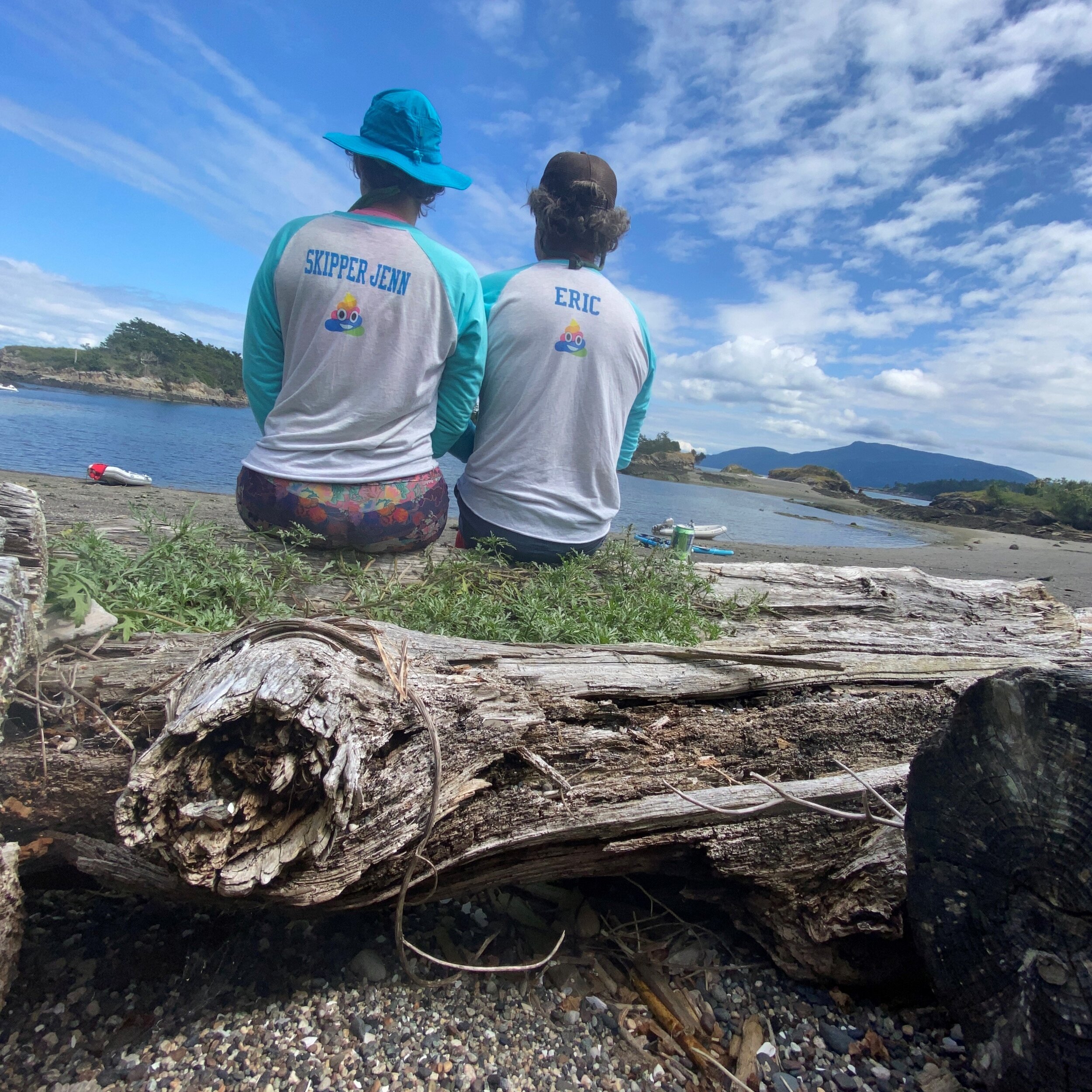DEAR SKIPPER JENN: CRUISERS IN CONFLICT
Steps for making a good team
Nothing says love, teamwork, and gleeful nerd alert like matching t-shirt swag. Sucia Island, Washington State, USA.
Dear Skipper Jenn,
This is my first season cruising full time with my partner and I have found that we argue a lot on the boat. We argue about big things and stupid things. I feel like I can’t get away from his bad moods. I love him a lot, I have always dreamed of cruising, but I am starting to hate sailing because of this and question our relationship. Can you help?
Dear Cruisers in Conflict,
Have you seen that meme that says, “I’m sorry for what I said when we were docking?” I’ve lived that out more times than I would like to admit. Cruising couples are a unique breed, with potential for extraordinary bonding and teamwork, and disastrous emotional shipwrecks. The stakes can be high with your relationship and cruising dreams on the line. Because of this, the interpersonal aspects of sailing are just as important as the logistical ones; especially for romantic couples.
Teaming is about psychological safety, the ability to trust one another to be able to communicate about anything without fear of retribution. I am going to outline two key strategies to build greater trust with tangible advice on how to rig them into your lives for smoother seas.
The first strategy is to reinforce the bond. Think of this like preventative and ongoing maintenance care in your relationship. The second strategy is to learn to fight better. This is your crisis protocol for when shit inevitably hits the fan. Conflict is unavoidable, it’s part of life. How you do it is what matters.
Three ways to reinforce the bond:
1. Daily gratitude. Appreciation is powerful. We tend to take our loved ones for granted, especially in long term relationships. Humans also tend to focus on the challenges instead of the positives as a rule. When Eric brews and hands me coffee every morning, I sing his praises and give appreciation every time. It’s not just a quick thanks but an enthusiastic one: “I am so lucky to have a sexy-hawt man to hand me coffee every day.” (A little flirting never hurts.)
2. Transition rituals. Pay attention to your daily rituals, particularly around hello’s/goodbyes and waking/sleeping. These are critical times for our nervous systems and opportunities to reinforce bonds. Make sure to have some contact like a hug, a phrase or running joke, or a smile with eye contact. These simple things will go a long way for reinforcing your relationship. For sailors, transitions also look like watch changes, docking, sail changes, and anchoring. Create some intention and communication around these times so they go smoother. Every sailor knows a yummy beverage or snack after a hard team task helps.
3. Regular meetings. Schedule time weekly or monthly to talk about your relationship. Do it with a meal or during pleasurable activity like a walk. Invite your partner into your emotional experiences and talk about what is working and what you would like to shift or change. Share feelings and give one another empathy throughout the exchange. You will find over time, that this is much like cleaning house, if you keep up on it you won’t have huge messes of resentment or baggage to deal with down the road.
Here is a list of helpful topics to cover in these meetings with an intention of teaming and growth mindset on what you can learn from and do better.
· Lifestyle logistics. Meal planning, maintenance, money, etc. This is also where you can discuss sailing strategy and duties. Do you like the way you are communicating and doing sail changes? How is your teamwork on weather routing or navigation? Sailing lifestyle is complex, you depend on one another for so much, talk about it regularly.
· Work and Money. How is your professional life going, how does it impact you and the relationship? How is your budget, what are your expenditures? How do you talk about money together?
· Social Lives. How are your family and friends? Are you getting enough interaction with them or too much? Are you getting enough quality time with your partner? Are you getting enough space for yourself?
· Emotional Lives. Address any conflicts you have had. Talk about irritations or resentments with a vantage point of wanting to understand and support one another. Look for the needs driving both of your behavior and how to resource them differently.
· Bodies. How have you been feeling lately? What does your body need? How can your partner support you?
· Sex and loving touch. This is hard for some folks, but physical intimacy is important in relationships and talking about it helps take out assumptions and gives permission to ask for what you want and need.
Three ways to fight better.
1. Self-soothing and Co-regulation. How we engage conflict is everything. When both parties can stay calm in conflict, we can problem solve and negotiate. Fighting happens when one or both people are upset and not emotionally regulated— fancy psychology speak for “calm”.
· Conflict Code Word. Agree upon a code word for rough moments. If you perceive your partner is getting too upset and can’t be productive in communication, or if you have hit that wall yourself, have an agreed upon code word that indicates you both need a break to calm down. You can come back to the topic later. Being able to rely on one another to either stay calm, or support one another when you are not creates trust.
2. Growth mindset. This is critical for sailors. How many of us have to rig something wrong 99 times before we get it right? That’s how humans learn, through our mistakes. Relationships are the same.
· No Blame. Blame in a team or relationship is toxic. It puts us in an “us against them” zero-sum game mentality. Instead, commit to looking for the “we” in all situations. What could WE do differently next time? Get curious. “How can I support you?” Be clear. “I really need xyz to do this well.”
· No Shame. Like blame, shame is toxic. Shame stunts growth and limits connection. Humans need compassion to grow. Giving our partners a continuous generous assumption that they are doing the best they can with what they have is important. Offering our kindness and understanding to support their growth is paramount.
3. Rupture and Repair. When we say or do things that are hurtful, we need to repair.
· Apology Language. Just like love languages, there are apology languages that are helpful to know about one another. Eric is fine with a quick acknowledgment. A simple “I’m sorry,” is enough for him to let it go easily and move on. I hold grudges and have a long analytical memory that needs accountability, a plan, and a lot of reassurance to move on. A solid apology looks like, “I’m sorry, and I am aware you’ve told me this before. I want to change this pattern, and here are the steps I am taking to do that.”
On a boat, all relational dynamics are heightened, for better or worse. You are in a tiny space, dependent on one another for literal survival, and often in intense situations. Sailing couples have a unique opportunity to become cohesive super couples when the relationship is engaged with a mutual intention of health and growth. They sadly can also devolve into toxic relational habits if you both don’t prioritize the interpersonal aspects of the lifestyle.
If you feel like you need support in getting on the same page, ask for help. Couples work can be done virtually or in person and can be an invaluable investment for both your relationship and the longevity of your cruising dreams. I have listed my top three favorite couples’ modalities backed by great science and success rates below.
Emotionally Focused Couples Therapy
PACT Psychobiological Approach to Couples Therapy
FROM WOMEN WHO SAIL NEWSLETTER | ISSUE 6. | FEBRUARY 2021.
TO RECEIVE MORE ARTICLES LIKE THIS, SUBSCRIBE TO OUR NEWSLETTER.
sKIPPER JENN
Jenn Harkness is a human being, artist, coach, therapist, writer, friend, mermaid, student of life and lover of all shine and sparkle. She is also Editor-in-Chief of the WWS Newsletter. You can find more of my writing over at skipperjenn.com. Pictured here is my partner, Eric. I write about relationship themes often with couples advice. While I am a mental health counselor and life coach, and have expertise on human behavior and social dynamics, this series is not intended to be mental health treatment. If you are struggling, please seek personal professional help. Everyone needs support sometimes, being human is weird, complicated and can be hard. May we all sail in peace.


